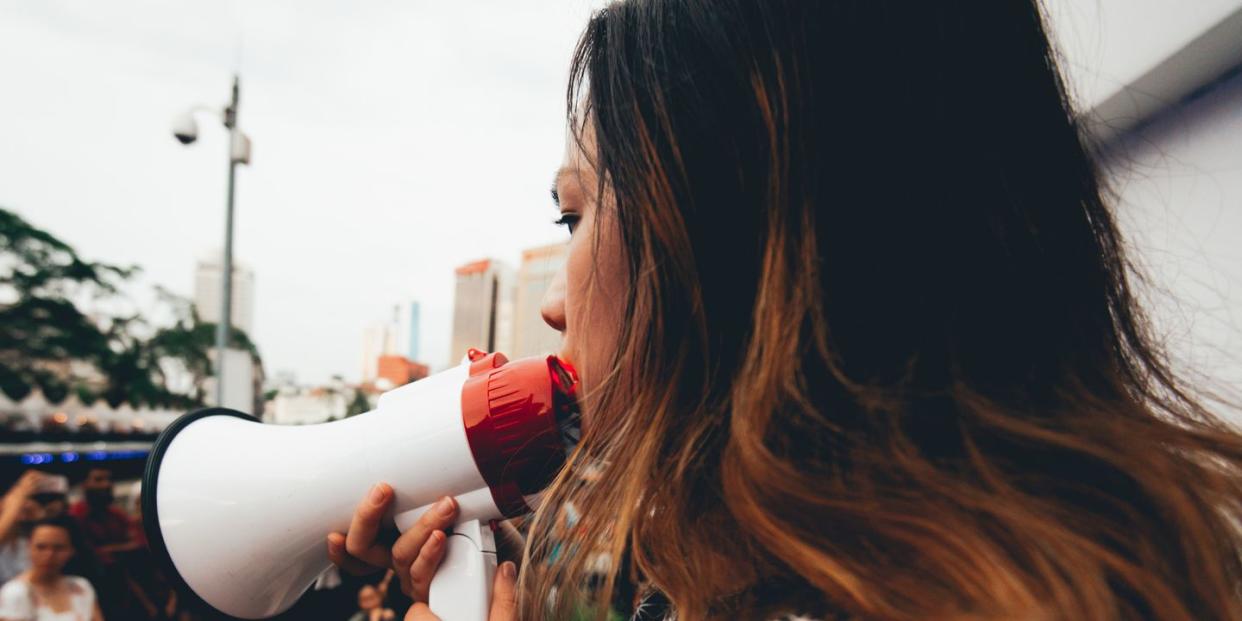These 3 Emotions Are A Huge Reason Why People Don't Respond To Social Injustice In An Anti-Racist Way

The past few weeks have been mentally draining. With the recent and racist killings of Ahmaud Arbery, Breonna Taylor, George Floyd, Tony McDade and several others, it's been difficult navigating conversations with friends, coworkers and social media followers who I'm not sure will understand what I'm going through.
But as tough as it's been to communicate, I wouldn't choose silence over not speaking out at all. Why? Because silence and complacency is never the answer to racism. And often times, the only way to spark change is to demand it—whether through social media posts, donating to civil rights organizations, or protesting in your community.
That being said, I know there are people out there who don't feel comfortable having conversations around or sharing thoughts on social injustice. And to that I'd say: Consider asking yourself why. If you want to be an ally but you're hesitant about advocating publicly for the equal treatment of black Americans or any marginalized group of people, doing some self reflection can help you pinpoint if you're feeling this way because you've given into one of "the three F's," says Candice Hargons, PhD, director for the Center for Healing Racial Trauma.
These are the emotions that typically play a role in whether or not someone will respond to social injustice in an anti-racist manner: fear, fatigue, and not giving a f*ck. Let's break them down a bit:
Fatigue: Some people feel they don't have the energy to engage in the battle against racism, Hargons says. A lot of that fatigue stems from the fact that they may already be dealing with other intersecting identities (think: ethnicity, class, sex, age, sexual identity, etc.) that come with their own set of discriminations. But that doesn't give you permission to stay silent. If you're overwhelmed at the idea of tackling racism, imagine the energy level of the people being victimized. And remember that no one is asking you to take it on by yourself. There have been demonstrations in at least 584 cities and towns so far, across all 50 states, per USA Today and George Floyd's GoFundMe surpassed $13 million. This advice for prioritizing your mental health while fighting racism can also help you combat fatigue.
Fear: Some people are afraid of what they will lose (think: job, friends, relationships) if they engage in anti-racist efforts, Hargons explains. But fear is an inevitable part of change—and change is necessary to prevent the continuation of systemic racism. "We don't have to be fearless," says Hargons. "We just have to be willing to do the scary, but righteous thing, anyway."
Not giving an F: "Some people ignore or deny racism, because it disrupts their belief that the world is just," Hargons says. And rather than working through that cognitive dissonance (or the discomfort of conflicting ideas) in a healthy way, they suppress empathy and double down on pre-established beliefs, she explains. Here's an example: Let's say you're married to a police officer who is good and fair. But you've seen on television the disproportionate effects of police killings of black Americans. And instead of speaking out on this topic, you choose to remain silent because you'd rather not believe that your husband is in a line of work where people are treated differently because of the color of their skin. But ignoring this reality helps no one—not you and definitely not black Americans. Instead, you might want to consider that you're in a unique and important position to enact change.
"We can remember that courage isn't comfortable," Hargons says. "And that's okay." But I certainly won't allow it to paralyze me into doing nothing at all—and I hope you won't, either. Click the links below for ways to get started on allyship:
You Might Also Like

